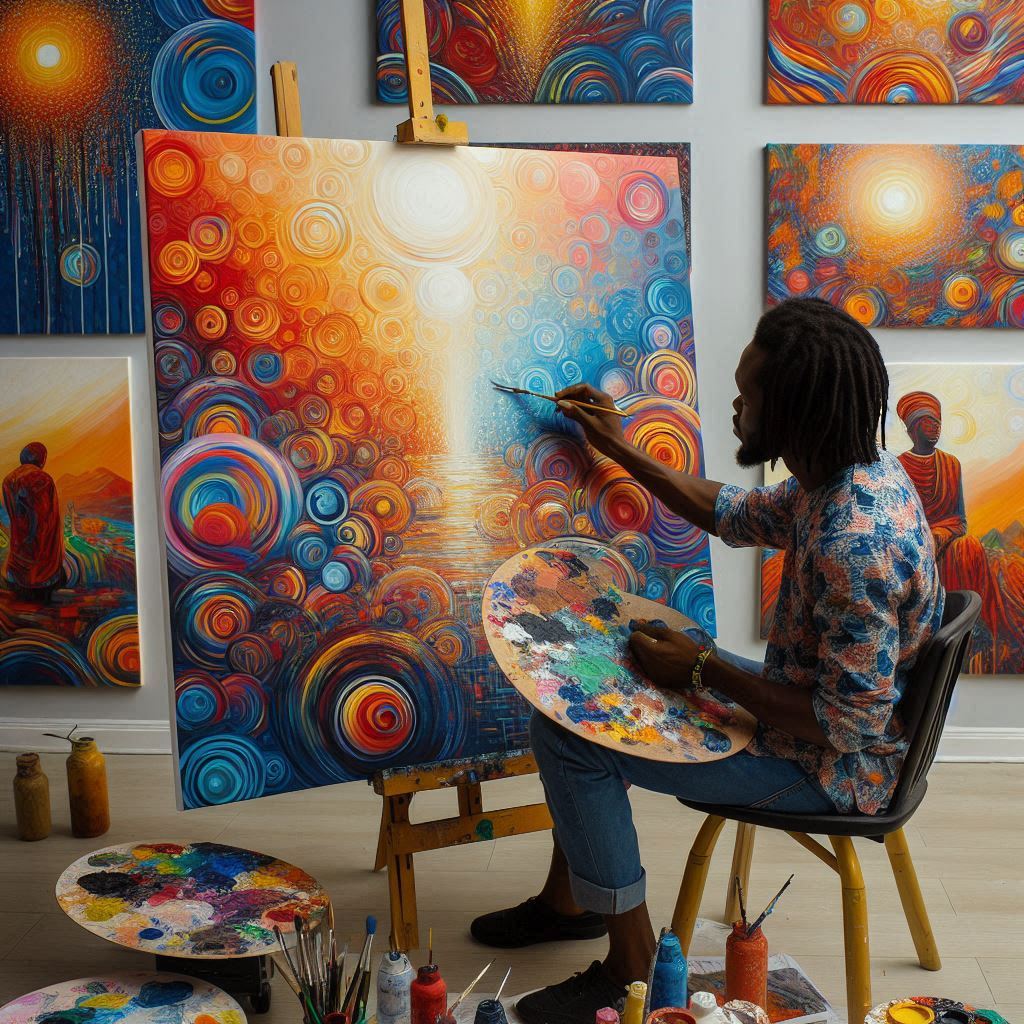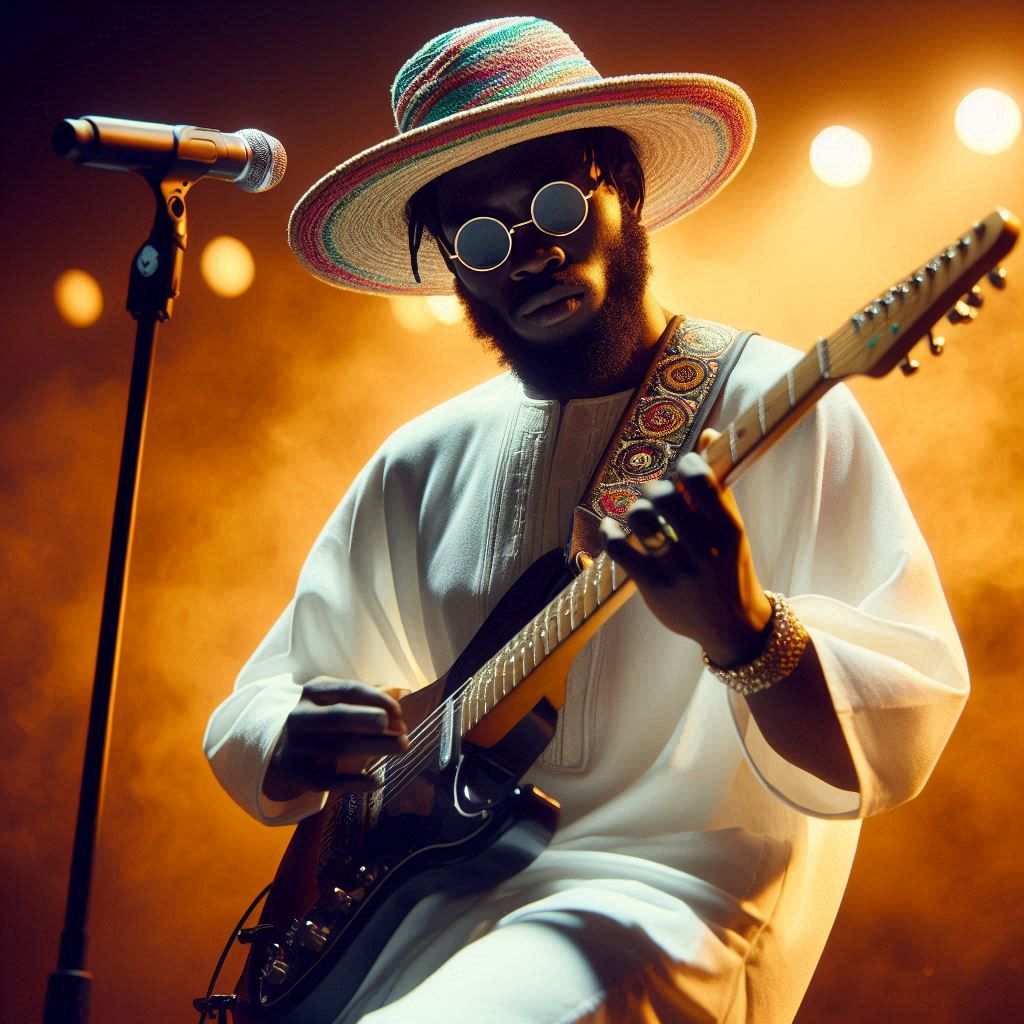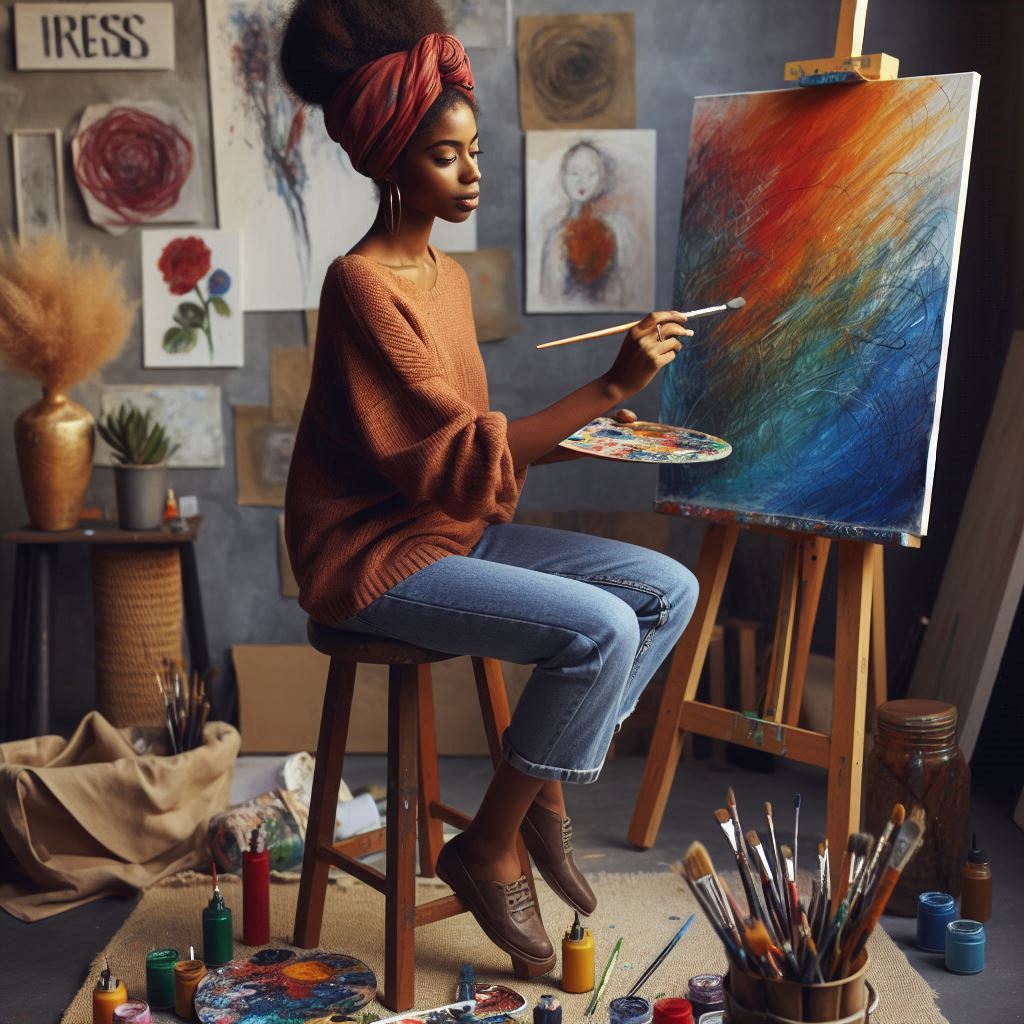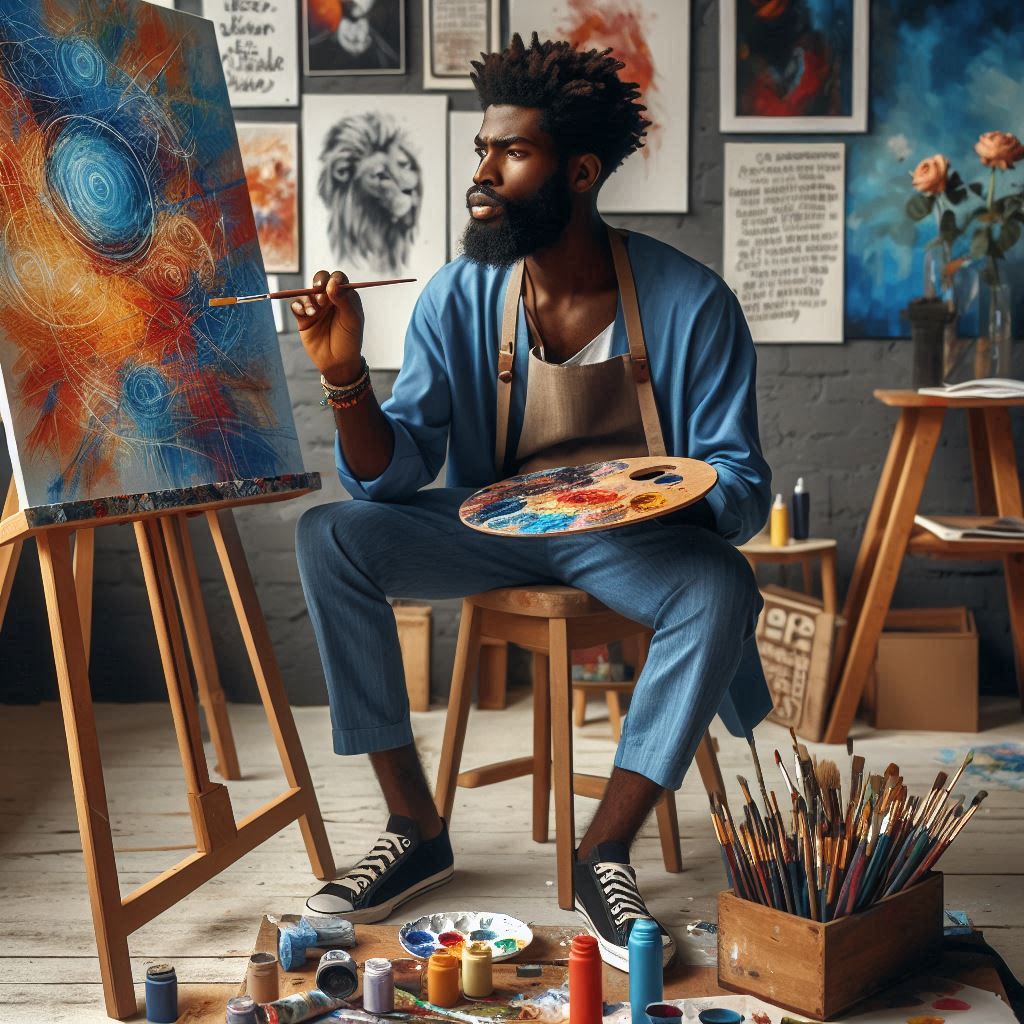Introduction
Nigerian folklore encompasses a wide range of oral traditions passed down through generations.
These stories, myths, and legends serve as a reflection of the country’s rich cultural heritage.
Brief explanation of Nigerian folklore
Nigerian folklore consists of stories, proverbs, songs, and rituals that are deeply rooted in the beliefs and customs of the various ethnic groups in Nigeria.
These narratives often feature supernatural beings, moral lessons, and historical events.
Importance of folklore in Nigerian culture
Folklore plays a crucial role in preserving the history and traditions of Nigerian communities.
It serves as a means of educating, entertaining, and passing down values from one generation to the next.
Folklore also helps to instill a sense of identity and pride in individuals, fostering a strong sense of community and belonging.
Transition to discuss artistic expression of folklore
One of the most captivating aspects of Nigerian folklore is its artistic expression.
This can be seen in various art forms such as literature, music, dance, visual arts, and theater.
Artists draw inspiration from traditional stories and symbols to create unique and innovative works that resonate with contemporary audiences.
Overview of Nigerian folklore
Nigerian folklore is a rich and diverse cultural heritage that encompasses a wide range of traditional beliefs, stories, and practices passed down through generations.
Definition of folklore
Folklore refers to the traditional beliefs, customs, stories, and practices of a particular culture or community that are transmitted orally or through other means.
Examples of Nigerian folklore tales, myths, and legends
- Anansi the spider: a trickster figure in Nigerian folklore known for his cunning and clever ways.
- Queen Amina of Zazzau: a legendary warrior queen who ruled the Hausa city-state of Zazzau.
- The Tortoise and the Birds: a popular folktale about the clever Tortoise outwitting the Birds.
Role of folklore in preserving Nigerian heritage and traditions
Folklore plays a crucial role in preserving Nigerian heritage and traditions by passing down cultural values, beliefs, and practices from one generation to the next. It serves as a reflection of the people’s identity, history, and worldview.
- Cultural Preservation: Nigerian folklore helps to preserve the unique cultural identity of different ethnic groups within the country.
- Transmission of Knowledge: Folklore is a medium through which traditional knowledge, wisdom, and skills are imparted to younger generations.
- Social Cohesion: Folklore fosters a sense of community and belonging among Nigerians by promoting shared values and beliefs.
- Education and Entertainment: Folklore serves as a source of education and entertainment, teaching important life lessons and providing amusement through storytelling, music, dance, and other art forms.
- Spiritual and Moral Guidance: Nigerian folklore often conveys spiritual and moral teachings that guide individuals in their ethical and spiritual conduct.
In general, Nigerian folklore preserves traditions, values, and knowledge passed down through generations, vital to cultural heritage.
By embracing these tales, Nigerians celebrate diversity, connect to their shared history, and understand their roots.
Read: How Nigerian Schools Address Student Psychology
Forms of artistic expression in Nigerian folklore
Visual Arts
Nigerian folklore has greatly influenced the visual arts in the country.
Artists create stunning paintings, intricate sculptures, and symbolic masks that are inspired by the rich folklore of Nigeria.
These artworks often depict mythical creatures, ancestral spirits, and legendary heroes from traditional stories passed down through generations.
The vibrant colors and intricate details in these works reflect the deep cultural significance of Nigerian folklore.
Performing Arts
Traditional dances, music, and theater in Nigeria are deeply rooted in folklore.
These artistic expressions connect with the past, honor ancestors, and celebrate stories passed down through generations.
Dancers perform intricate routines, musicians play traditional instruments, and actors bring folklore characters to life on stage.
Through these performances, the spirit and essence of Nigerian folklore are preserved and shared with audiences around the world.
Literature
Nigerian writers have been incorporating folklore themes into their works for decades.
From novels and short stories to poems and plays, literary works draw inspiration from Nigerian folklore’s rich tapestry.
Writers weave elements of mythology, legend, and tradition into their stories, creating engaging narratives that resonate with readers.
By incorporating folklore themes into their writing, Nigerian authors are able to pay homage to their cultural heritage while also exploring universal themes of love, loss, and redemption.
Read: Psychology and Counseling Services in Nigerian Schools
Influence of Nigerian folklore on contemporary art
When examining Nigerian folklore and its influence on contemporary art, it is evident that traditional stories, themes, symbols, and characters play a significant role in shaping modern artistic expression.
Influence of Nigerian Folklore on Contemporary Art
Nigerian folklore inspires artists with rich stories and imagery that resonate with audiences today.
Themes like bravery, love, betrayal, and redemption are often explored in contemporary artworks, reflecting timeless narratives.
Furthermore, modern art pieces often incorporate symbols and motifs from Nigerian folklore, adding layers of meaning and cultural significance.
For instance, blending traditional patterns, colors, and motifs in art connects contemporary works with cultural roots.
Exploration of Themes, Symbols, and Characters from Folklore in Modern Artworks
Contemporary Nigerian artists often delve into folklore’s rich tapestry of characters and stories to create innovative works.
Artists reinterpret traditional narratives for a modern audience, breathing new life into old tales and keeping them relevant.
Themes like the power of nature, the struggle between good and evil, and the importance of community are commonly explored.
Drawing on timeless themes, artists create pieces that resonate emotionally with viewers on a deep level.
How Nigerian Artists are Reinterpreting Folklore for Contemporary Audiences
Nigerian artists are constantly finding new ways to reinterpret and reimagine traditional folklore for contemporary audiences.
Blending traditional storytelling techniques with modern artistic methods allows artists to create visually stunning and emotionally captivating works.
One common way that Nigerian artists reinterpret folklore is by updating traditional stories with contemporary themes and settings.
Placing ancient characters and narratives in a modern context makes these tales more accessible and relatable to today’s audiences.
Examples of Popular Nigerian Artworks Inspired by Folklore
- Ben Enwonwu’s “Anyanwu”: This iconic sculpture captures the spirit and beauty of the sun deity from Igbo mythology, symbolizing renewal and growth.
- Nnenna Okore’s “Ezi”/”The Good Will Win”: This mixed media piece explores the theme of resilience and perseverance, drawing inspiration from Yoruba folklore.
- Peju Alatise’s “Flying Girls”: This installation art piece tells the story of young girls who gain the ability to fly, inspired by the legend of the Zuma rock in Nigeria.
Essentially, Nigerian folklore inspires contemporary artists, shaping themes, symbols, and characters in modern artworks.
Artists reinterpret traditional narratives for today’s audiences, keeping timeless tales alive and relevant in a changing world.
Read: Psychological Impact of COVID-19 on Nigerians
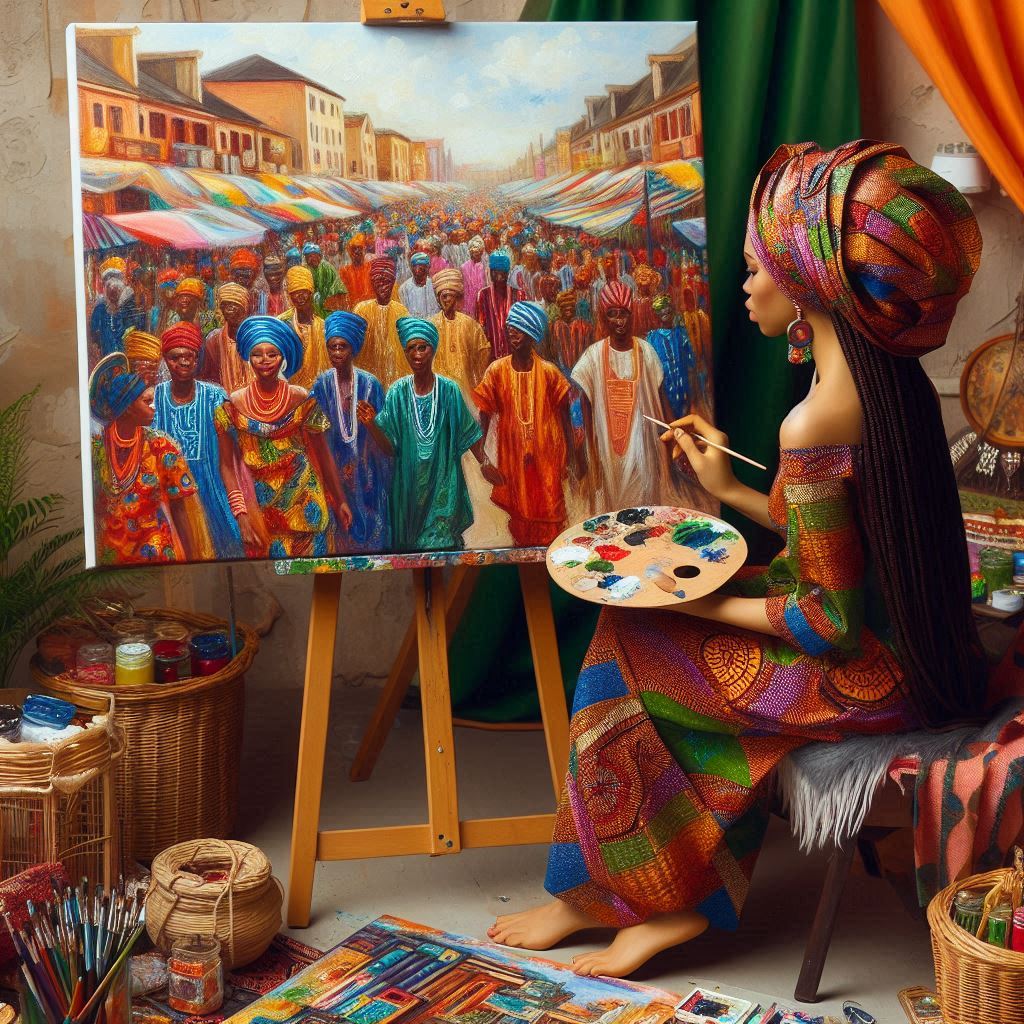
Cultural significance of Nigerian folklore
Nigerian Folklore and Its Artistic Expression
Nigerian folklore holds immense cultural significance. It preserves the rich traditions and history of diverse Nigerian ethnic groups.
Through stories, myths, and legends, folklore serves as a vital link to the past, connecting generations and maintaining cultural continuity.
Cultural significance of Nigerian folklore
Nigerian folklore encapsulates the values, beliefs, and practices of various communities.
It plays a crucial role in defining social norms and guiding behavior.
These stories often carry moral lessons, teaching listeners about integrity, bravery, and community responsibilities.
The folklore acts as a repository of knowledge, offering insights into the people’s worldview, spirituality, and social structure.
The connection between folklore and identity in Nigerian society
Folklore is deeply intertwined with Nigerian identity.
It shapes how individuals see themselves and their place in the world.
For many Nigerians, folklore is a source of pride, highlighting the unique aspects of their heritage.
The stories reflect the collective identity of ethnic groups, emphasizing shared experiences and communal bonds.
By celebrating folklore, Nigerians affirm their cultural identity and foster a sense of belonging.
Role of folklore in passing down cultural values and beliefs
Folklore plays a pivotal role in transmitting cultural values and beliefs from one generation to the next.
Elders tell these stories to the young, ensuring that traditions are not lost.
Through storytelling, children learn about their ancestors’ wisdom and the importance of maintaining cultural practices.
This oral tradition reinforces community cohesion and ensures that cultural heritage remains alive and vibrant.
Impact of folklore on shaping Nigerian art, literature, and entertainment industry
Nigerian folklore significantly influences the country’s art, literature, and entertainment industry.
Many Nigerian artists draw inspiration from traditional stories, incorporating folklore themes into their work.
Folklore provides a rich tapestry of characters, motifs, and narratives that enrich visual arts, from paintings to sculptures.
In literature, Nigerian writers often weave folklore into their narratives, creating compelling stories that resonate with readers.
Authors like Chinua Achebe and Wole Soyinka have used folklore to explore complex social issues and human experiences.
These literary works entertain, educate, and provoke thought, bridging the gap between the past and the present.
The entertainment industry, especially Nollywood, also draws heavily from folklore.
Films and TV shows often adapt traditional tales, presenting them in contemporary settings.
This fusion of old and new appeals to a wide audience, preserving folklore while making it relevant to modern viewers.
Folklore-based movies and series entertain and educate, showcasing Nigeria’s rich heritage to the world.
Generally, Nigerian folklore is a cornerstone of cultural expression and identity.
It preserves history, transmits values, and inspires artistic creation.
By engaging with folklore, Nigerians connect with their roots and ensure the continuity of their rich cultural legacy.
Folklore’s influence on art, literature, and entertainment highlights its enduring power and relevance in contemporary society.
Read: The Future of Psychology Education in Nigeria
Challenges in preserving and promoting Nigerian folklore
Preserving and promoting Nigerian folklore faces several challenges in today’s rapidly changing world.
The impact of globalization and modernization on traditional practices is a significant threat to the survival of these cultural treasures.
The lack of support and resources for folklore preservation increases the risk of losing these valuable heritage elements.
Threats of globalization and modernization on traditional folklore practices
- Technological advancements replace oral traditions with digital media.
- Youth disinterest in traditional folklore due to influence of global pop culture.
Globalization and modernization endanger Nigerian folklore by diluting and eroding traditional beliefs and practices through Western influences.
Technological advancements replace oral traditions passed down through generations with digital media. This shift disconnects communities from their cultural heritage.
The younger generation shows disinterest in traditional folklore due to the influence of global pop culture. This trend threatens the sustainability of ancient practices.
Lack of support for folklore preservation and promotion
- Insufficient funding for folklore research and documentation.
- Limited awareness and appreciation of the value of Nigerian folklore.
One of the main challenges in preserving and promoting Nigerian folklore is the lack of support in terms of funding for research and documentation.
Without adequate resources, the efforts to safeguard these cultural treasures are greatly hindered.
Additionally, the limited awareness and appreciation of the value of Nigerian folklore among the general population contribute to the lack of incentives for preservation efforts.
Strategies for safeguarding Nigerian folklore for future generations
- Educational programs to raise awareness about the importance of folklore.
- Collaborations with universities and cultural institutions for research and preservation.
- Creative initiatives such as folkloric festivals and exhibitions to showcase cultural heritage.
Despite the challenges, there are several strategies that can be implemented to safeguard Nigerian folklore for future generations.
Educational programs can be developed to raise awareness about the significance of folklore in preserving cultural identity.
Collaborations with universities and cultural institutions can also play a crucial role in research and preservation efforts.
Creative initiatives such as folkloric festivals and exhibitions provide platforms to showcase the richness of Nigerian cultural heritage and engage the community in preserving these invaluable traditions.
Uncover the Details: Admission Requirements for Political Studies in Nigeria
See Related Content: The Rise of Independent Nigerian Filmmakers
Uncover the Details: Strategic Studies: Conflict Resolution in Nigeria
Uncover the Details: Overview of English Language Studies in Nigerian Universities
Explore Further: Leading Criminologists in Nigeria
Learn More: Challenges Facing Anthropology Studies in Nigeria
Explore Further: History of Anthropology Studies in Nigeria
Explore Further: Publishing Your Research in African and Asian Studies
Uncover the Details: How to Succeed in Comparative Politics in Nigeria
Collaborations between artists and folklorists
In the preservation of Nigerian folklore, collaborations between artists and folklorists play a crucial role.
This partnership combines the research and documentation skills of folklorists with the creative expression of artists, resulting in a rich tapestry of cultural storytelling.
Importance of collaboration between artists and folklorists in preserving folklore
By working together, artists and folklorists can ensure that Nigerian folklore is not only preserved but also promoted to a wider audience.
Artists bring the stories to life through their creative interpretations, while folklorists provide the historical context and accuracy needed to maintain the integrity of the folklore.
Transform Your Career with Expert Guidance
Get personalized mentorship consulting that’s tailored to your unique path. Our expert advice is actionable and exclusive.
Get StartedExamples of successful partnerships in documenting and promoting Nigerian folklore
- Chinwe Ifeoma Chukwuogo-Roy and Professor Duro Oni collaborated on the book “The Story of the Orisha” which showcases traditional Yoruba myths and legends through vibrant illustrations.
- Photographer George Osodi worked with folklorist Dr. Dele Oguntoye to document the rich oral traditions of the Benin Kingdom in Nigeria, resulting in a powerful series of photographs that bring these stories to life.
- Visual artist Yemi Oyetunji collaborated with folklorist Dr. Uche Igwe to create an interactive exhibition exploring Igbo folklore and traditional beliefs, combining visual art with oral storytelling.
Benefits of interdisciplinary approaches in showcasing Nigerian folklore through art
Interdisciplinary approaches that combine art and folklore not only preserve and promote Nigerian cultural heritage but also provide new avenues for creativity and innovation.
By bridging the gap between academic research and artistic expression, these collaborations help to keep Nigerian folklore alive and relevant in the modern world.
See Related Content: Interview with Prominent Nigerian Art Educators
You Might Also Like: Top Fashion Schools and Programs in Nigeria
Conclusion
Overall, Nigerian folklore plays a significant role in artistic expression by providing a rich source of inspiration for artists.
It allows them to delve into the cultural heritage of Nigeria and incorporate traditional stories, myths, and symbols into their creative works.
By showcasing Nigerian folklore in various art forms such as music, dance, painting, and sculpture, artists are able to preserve and promote the country’s diverse cultural history.
Recap of the significance of Nigerian folklore in artistic expression
Nigerian folklore serves as a bridge between the past and the present, connecting people to their roots and identity through art.
It fosters a sense of community and provides artists with a unique platform to express their creativity while paying homage to their cultural heritage.
Call to action to support initiatives that promote Nigerian folklore
It is essential for individuals and organizations to support initiatives that promote and preserve Nigerian folklore for future generations.
By investing in cultural programs, workshops, and exhibitions, we can ensure that Nigerian folklore continues to thrive and inspire artists around the world.
Encouragement for artists to continue drawing inspiration from folklore in their creative works
As artists, it is important to continue drawing inspiration from Nigerian folklore and integrating it into our creative processes.
By doing so, we not only enrich our artistic practice but also contribute to the preservation and celebration of Nigeria’s rich cultural heritage.

